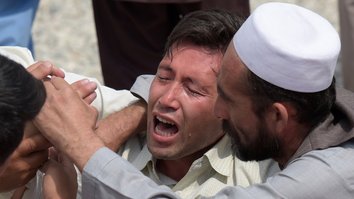KABUL -- Afghanistan observed a national day of mourning July 24, a day after a twin suicide bombing in Kabul killed at least 80 people and injured 231, according to the Afghan Ministry of Interior.
The attacks took place during a demonstration by tens of thousands of Afghans who were seeking the re-routing of a power line from Turkmenistan.
The first suicide bomber blew himself up near some demonstrators. A second bomber followed moments later.
Security forces killed a third bomber before he could detonate his device.
Hundreds of Kabul residents rushed to hospitals to donate blood.
"It was a barbaric act and was painful for all ethnic groups of Afghanistan," said Ahmad Masoud, 29, of Parwan Province, who went to Esteglal Hospital in Kabul as a blood donor.
Outrage among citizens
"Participating in a civil and peaceful demonstration is the constitutional right of every citizen of this country," Dawood, one of the participants in the demonstration, told Salaam Times.
"Unfortunately, a group of individuals who do not believe in any civil, political or humane values have targeted our civil and peaceful demonstration and martyred scores of innocent people," he said.
The "Islamic State of Iraq and the Levant" (ISIL) claimed responsibility for the attacks.
The National Directorate of Security identified the mastermind as Abu Ali, an ISIL commander in Achin District, Nangarhar Province.
Sympathy, grief and horror were universal among Afghan political parties, civil society groups and the general public.
Afghan users of social networking sites shared pictures of the massacre and replaced their usual profile pictures with black banners to convey their anger and sympathy.
Many protesters camped at the site overnight, holding candlelight vigils and reciting Koranic verses even though the government announced a 10-day ban on public gatherings on security grounds, AFP reported.
Leaders denounce atrocity
In a speech televised a few hours after the massacre, Afghan President Ashraf Ghani called it "an attack on the civil liberties of the citizens of Afghanistan".
Ghani, who declared July 24 a national day of mourning, ordered the country's security and health agencies to spare no effort in caring for the wounded.
Government Chief Executive Abdullah Abdullah published his own statement denouncing the suicide bombing and ordering security forces to do everything possible to track down the organisers.
"Protests and making use of peaceful means for achieving legal demands is the right of every citizen, and the government should provide this right," the statement said. "Attacks on civilians and demonstrators are against all Islamic and international principles."
The bombing was "an inhuman and un-Islamic act", Afghan MP Raihana Azad said.
"Murdering civilians who were demonstrating for their rights has no justification," she told Salaam Times.
The Afghanistan Independent Human Rights Commission (AIHRC) called the mass murder "an unforgivable crime".
World leaders added their own denunciations, including UN Secretary-General Ban Ki-moon, Pakistani President Mamnoon Hussain and Pakistani Prime Minister Mian Muhammad Nawaz Sharif.
"The lines of Afghan men and women who queued to donate blood for their injured compatriots was a poignant indicator of the Afghan people's resilience and solidarity in the face of terrible violence," the United Nations said.

![Afghan citizens run away from the site of a twin suicide attack in Kabul July 23. The 'Islamic State of Iraq and the Levant' (ISIL) claimed responsibility for the attack, which killed more than 80 people. [YouTube video grab]](/cnmi_st/images/2016/07/25/5926-kabul_runners1-585_329.jpg)






